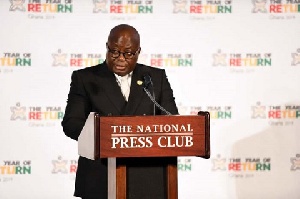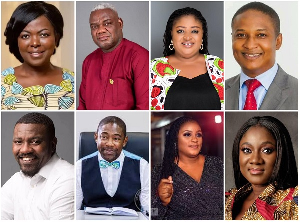Press conferences are interesting events.
Well, they can be interesting, they can be boring and as the whole world saw recently with the encounter between President Trump and the CNN White House Correspondent, press conferences can be dramatic as well.
There, right in front of the whole world, we saw the President of the United States drawn into a very public row with a journalist.
I have been to a few of these events in my life. Some of them lived up to their billing and were gripping and interesting, some of them were informative and many of them were forgettable.
There are different types of press conferences and there used to be rules guiding the various types.
If you were going to a company’s scheduled annual or bi-annual press conference, things would be much different from a press conference called by that company because the Chief Executive has hit the headlines for the wrong reasons.
This latter type is likely to have been a hurriedly called press conference and is likely to be more heavily patronised than the scheduled annual event.
Sports press conferences
I have always been intrigued by the sports press conferences, most of which I find quite excruciating.
It is part of the modern world’s mode of watching pain being inflicted on other humans and enjoying it.
Why else would someone, who has just been in an emotionally and physically exhausting encounter and lost a match, be expected to come and face a roomful of journalists and be questioned?
Take the tennis players, for example
They cannot say I don’t feel up to sitting in front of a group of journalists right now when I have just lost a match to this person that I do not like at all.
The player has no choice in the matter, it is part of the contract, the post-match conference is obligatory and is part of the prize money; win or lose, you have to appear at the press conference and answer the questions.
The sports journalists are in a class of their own. “So what do you think happened out there”, the beaten man, the woman, who has just lost a match, is asked and he or she is expected to find a witty and pithy answer to help the journalists with their headlines.
I would never know why the players don’t just say, “you were watching and, therefore, had a better view, I only had 50 per cent of the view and you should know better than I would, what happened out there. I just got defeated.”
Or take the boxer who has just been pummelled until his eyes are closing involuntarily and his face has taken on the topography of hills and valleys and he is asked what happened out there.
Surely he is entitled to offer a rude answer in such circumstances; but they never do, they find some innocuous thing to say all the time.
A far cry from a favourite vice chancellor of mine, who, when some poor young person asked him a question he did not like at a press conference, said famously, “a foolish question, deserves a foolish answer” and asked the questioner to sit down. I doubt anyone can get away with that in today’s world.
Unfortunately, if you are a sporting celebrity, the manager of a famous team or the captain of a national team, you can be asked all the foolish questions ever imagined, but you can never, ever give a foolish answer.
Unless the person holding the press conference has some earth-shaking and unexpected news to announce, the more interesting part of the event is always the time for questions.
The journalists are expected to tease out interesting answers or facts that would otherwise not be offered to the public.
President’s press confab
The President of our Republic is scheduled to address a press conference today Wednesday, December 19. It is always quite an event.
Even though in these days of social media and 24-hour news, I can’t help but wonder that there is anything left to say at a press conference, but it appears there is.
There are likely to be far, far more journalists wanting to be at the press conference than the room can accommodate.
The first problem, therefore, is always, who is invited and who is not. There are more than 300 FM stations, we are told, and television stations and newspapers and online websites and bloggers, who, I hear, expect to be invited because they claim to have numerous followers, and there are foreign correspondents.
So, before we get going, there will be a story out there about NDC papers and FM stations not being invited.
The President is likely to want to put in his story first, for after all, he called the press conference; then the fun will start at question time.
There will be journalists who would arrive with their questions prepared, written up and rehearsed and they will be determined to ask their question, come hell, come high water.
It wouldn’t matter if the President had given a fulsome answer in his presentation, the journalist had come prepared to ask that question and so it will be asked.
The Minister of Information or whoever is compering the event will make some new enemies because not everybody who puts his hands up to ask a question can be called.
Should a journalist be called to ask a question because he has the sobriquet of Senior attached to his journalist?
Do senior journalists ask more interesting and relevant questions than the junior ones?
What are we to make of the embarrassing interventions that are not really questions but only succeed in showing up the journalists in not very flattering lights?
Should there be a time limit placed on how long questions should take? And what about follow-up questions? Who should decide if there could be follow-up questions.
The journalists obviously see themselves as representing the people of Ghana and are asking questions on their behalf. Who should dare stop them?
Unless we are going to adopt the Vladimir Putin format of yearly press conferences, which go on for the whole day, we are always going to have dissatisfied journalists and members of the public after these events.
We are not likely to witness a Trump versus Jim Acosta moment, our Addo Dankwa, having spent a lifetime in the rough and tumble of courtroom drama and politics, is not likely to take the bait and lose his cool, no matter how provoked.
He also is not likely to do a “foolish question deserves a foolish answer”, which is really a pity.
Difficult moments at press conferences come for Presidents and other high officials when they are asked questions they have not prepared for and they try to talk their way out of it and end up in a corner.
This President unnerved everybody at his last press conference by simply saying he did not know to a question he was asked. That is not part of the script.
I have been wondering if we should all have a radical rethink about these presidential press conferences.
If it is the staged drama we crave, I hope, in the midst of the entertainment, everyone finds something satisfactory to take away. It is the season of goodwill.
Opinions of Wednesday, 19 December 2018
Columnist: Elizabeth Ohene



















